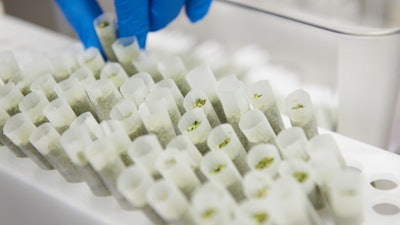
The cannabis industry is presently facing unparalleled growth, largely because of legalization in many states. Plus, there has been a surge in consumer demand, which has propelled manufacturers to place a focus on scaling their businesses—fast.
However, as with any rapid expansion, new opportunities are usually accompanied by some cumbersome challenges. In the cannabis industry specifically, manufacturers deal with regulatory compliance, production efficiency, and managing customer expectations—just to name a few hurdles.
Therefore, for cannabis manufacturers committed to remaining at the forefront, agile product roadmapping software is an invaluable tool to streamline processes, align teams, and chart a flexible, future-focused path through rapidly shifting market landscapes. In this post, we will discuss some of the most pressing issues cannabis manufacturers face as well as how product roadmapping software can play a key role in improving processes.
Key Challenges in Cannabis Manufacturing
The legal cannabis market has opened new doors for manufacturers ready to capitalize, but challenges abound, including:
Regulatory Compliance
Cannabis is one of the most heavily regulated industries in the country—and laws and standards not only vary from state to state but don’t stop changing. Compliance involves everything from cultivation and harvesting to product labeling, testing, and distribution. Therefore, manufacturers must remain adaptable to avoid reputational damage, costly fines, and even losing their business licenses.
Quality Control & Testing
Consistent quality is directly connected to consumer trust as well as regulatory compliance. Cannabis products must adhere to strict quality and safety standards, including testing for contaminants such as pesticides and mold. Manufacturers need to stay ahead of threats in a real-time capacity.
Supply Chain Management
This challenge involves the sourcing of high-quality raw materials, identifying reliable suppliers, and navigating transportation restrictions due to the product’s controlled status. Additionally, inventory shortages or disruptions loom large. Contingency plans and supplier relationship tracking capabilities are non-negotiable.
Workforce Training & Retention
The expansion of the cannabis industry has created a gap in talent resources possessing cannabis-specific knowledge. All phases of the manufacturing process require specialized know-how, and even experienced workers need ongoing training to keep pace with regulatory standards, laws, and best practices. Additionally, this industry faces high turnover, which can interrupt operations and quality control.
Capital Limitations & Budgeting
Access to capital is limited because of federal regulations in regions where the product isn’t fully legal. As such, resource allocation must be optimized and budget frameworks carefully followed. Furthermore, scaling production, upgrading technology, and investing in sustainable business practices can be wildly expensive—especially when traditional financing options aren’t an option.
Environmental & Sustainability Goals
Sustainability is a hot-button topic in the cannabis industry as energy costs soar and consumers demand that companies they purchase from be “green.” Indoor cultivation is intensive and leads to high operational costs. Plus, there is considerable pressure to use sustainable packaging materials and reduce environmental footprints.
Adapting to Market Volatility
Fluctuations in consumer preferences, competitive pressures, and regulatory shifts lead to constant uncertainty. New products, trends, and regulations can all lead to wavering demand—resulting in challenges with production forecasting and managing inventory levels. A manufacturer must have the ability to pivot.
How Agile Product Roadmapping Software Addresses These Challenges
While challenges faced by cannabis manufacturers are significant, using best-in-class agile product roadmapping software can be a game changer.
Efficient Compliance Tracking
Agile roadmapping software can organize and centralize workflows, which makes it easier for manufacturing teams to monitor compliance tasks and confirm that processes align with current regulations. Plus, when rules change, agile tools can support quick workflow updates, so a real-time response is issued. Additionally, the software can help stakeholders prepare for inspections and adhere with laws, which reduces the risk of penalties and takes the stress out of audits.
Built-In Quality Control Processes
Roadmapping software can set milestones for quality checks throughout all phases of production. For instance, teams can build in checkpoints for contaminant testing as well as product potency and consistency to guarantee uniformity across batches. Plus, agile tools improve visibility to all team members, so deviations are easy to spot and correct.
Enhanced Supply Chain Collaboration
With agile software, collaboration and coordination among suppliers, distributors, and internal teams can be improved. Through shared dashboards and real-time updates, all parties within the supply chain can sync on inventory needs and timelines, which reduces delays and minimizes miscommunication. Additionally, these tools can help a manufacturer anticipate shortages, organize deliveries, and confirm that inventory levels are where they need to be.
Optimized Training Programs
Training programs can be organized into structured, user-friendly tasks. The tools can streamline onboarding processes, introduce better new hire training, and minimize employee learning curves. Plus, training collateral and other resources can be archived in the system, making them easily accessible, which contributes to the company’s culture and boosts retention.
Flexible Budgeting Capabilities
Agile product roadmapping can help a cannabis manufacturer better track expenditures and adjust financial allocations as priorities or market changes shift, which minimizes disruption due to unexpected costs and confirms that the most critical projects always have funding.
Supporting Sustainability Goals
It’s imperative that cannabis manufacturers remain aware of their environmental impact. Product roadmapping tools can track energy usage, water consumption, and waste management. Sustainability goals can be integrated and let companies better prioritize eco-friendly initiatives that reduce costs and enhance their reputation with consumers.
Adaptable Market Responsiveness
By now it should be obvious that the cannabis industry is flux. Agile product roadmapping tools provide real-time new product testing and can use consumer feedback to adjust production processes and refine marketing strategies. Finally, agile tools can help manufacturers remain at the forefront of experimentation, releasing small batches to test consumer sentiment without committing major resources.
Using Product Roadmapping in Cannabis Manufacturing
There are so many benefits associated with using product roadmapping software as part of your cannabis manufacturing organization, including the ability to manage complexity, streamline production, and realize growth.
Take time to assess the needs of your company as well as what your team needs and then look for an intuitive product that checks all the boxes, including opportunities for customization and scalability. Now is the time to think about how the latest agile tools can help your organization remain competitive, compliant, and ahead of the curve.






















